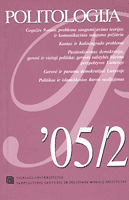Lietuvos parlamento struktūrinė diferenciacija ir darbo pasidalijimas: nuolatinių komitetų galios ir institucionalizacija
Structural Differentiation and Division of Labor in Lithuanian Parliament: Powers and Institutionalisation of the Standding Committees
Author(s): Alvidas LukošaitisSubject(s): Politics / Political Sciences
Published by: Vilniaus universiteto leidykla & VU Tarptautinių santykių ir politikos mokslų institutas
Keywords: Standing Committees of the Lithuanian Parliament; parliamentary institutionalisation analysis
Summary/Abstract: In every modern parliament "dual" structures exist that are parallel to each other - the factions representing various political forces (groups, clubs, etc.) and standing committees (commissions). The role these structures okay in various parliaments may vary significantly: factions may dominate in some parliaments whereas the committees (Woodraw Wilson called them "working horses" decades ago) - in the others. The relationship between the status of the factions and the committees, their power and influence may vary to a significant extent. For instance, under some specific circumstances, the parliament can be overwhelmed by the factions. Different circumstances could drive the standing committees to the leading role. On the other hand, there is a possibility that the powers of these structures and the influence they have on the parliamentary decision can be "balanced" in some way. However, such conclusions can be obtained under the long-term analysis of the parliamentary activities, alone. This article represents a case study analysing the powers rested in the Standing Committees of the Lithuanian Parliaments and the peculiarities of the institutionalisation process. The research is based on the concept of the parliamentary institutionalisation analysis applied in the political sciences. The powers of the standing committees and the level of their institutionalisation are examined and evaluated on the basis of the criteria of the structural-functional analysis. The article consists of five parts: in the first the reader is introduced to the institutionalisation criteria of the standing committees; in the second the author explores the structural characteristics of Lithuanian parliament's standing committees (the committee type, size and number) and the issues stemming from the attempts to define their jurisdiction; the committee-setting principles and the peculiarities of their composition are analysed in the third part; the role the committees play in the process of legislation is assessed in the fourth part whereas in the last part (amounting to conclusion) the author defines the powers of the standing committees of the Lithuanian parliament and the level of their institutionalisation. (...)
Journal: Politologija
- Issue Year: 2002
- Issue No: 3 (27)
- Page Range: 30-75
- Page Count: 46
- Language: Lithuanian

